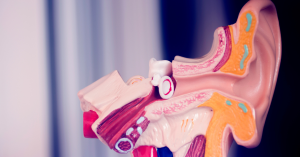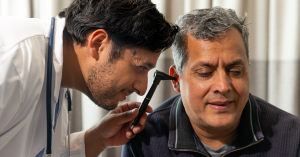Ear infections are more than just uncomfortable — they’re inconvenient, disruptive, and for some people, far too frequent. Whether it’s your child crying in pain late at night or your own ear feeling clogged and throbbing during a flight, ear infections can strike when you least expect them.
The good news? Most ear infections are preventable.
With the right knowledge and daily habits, you can drastically reduce your risk — or your child’s — of developing ear infections. It starts with understanding what causes them, then making small but powerful lifestyle adjustments that strengthen your defenses and keep your ears healthy.
In this guide, we’ll break down the proven methods to prevent ear infections naturally. From hygiene and nutrition to environmental awareness and pediatric care, you’ll learn everything you need to know to stay pain-free and avoid unnecessary doctor visits.
Understanding What Causes Ear Infections
You can’t prevent what you don’t understand. To keep ear infections at bay, it’s crucial to know how and why they develop. Ear infections can affect different parts of the ear and are caused by a range of factors — from bacteria and viruses to poor hygiene and environmental triggers.
Types of Ear Infections
There are three main types of ear infections, each with distinct causes and symptoms:
| Type | Location | Common Symptoms |
|---|---|---|
| Otitis Media | Middle ear (behind the eardrum) | Ear pain, fever, fluid buildup, temporary hearing loss |
| Otitis Externa (Swimmer’s Ear) | Outer ear canal | Itching, redness, tenderness, discharge after swimming |
| Otitis Interna (Labyrinthitis) | Inner ear | Dizziness, nausea, balance issues, hearing changes |
Each type requires a different prevention approach, but most can be avoided with consistent care, cleanliness, and immune support.
Common Triggers in Children and Adults
Certain factors make people — especially children — more vulnerable to ear infections. These include:
Small Eustachian tubes in children, which trap fluid more easily
Allergies or frequent colds that cause nasal congestion
Bottle-feeding while lying down (for infants)
Exposure to secondhand smoke
Swimming in contaminated or untreated water
Poor ear-drying habits after bathing or swimming
Adults may also develop infections due to:
Earwax buildup
Use of hearing aids or earbuds that aren’t cleaned properly
Frequent air travel or altitude changes
Understanding these triggers is the first step in reducing risk. Once identified, many can be managed or eliminated altogether with proper habits — which we’ll explore next.
Daily Habits That Reduce Infection Risk
Preventing ear infections isn’t about complicated routines. It’s about consistency. Small, everyday actions can create an environment where bacteria and viruses struggle to take hold — especially in the sensitive spaces of your ears.
Keep Ears Dry and Clean
Moisture and bacteria love dark, warm spaces — like the inside of your ear. Keeping your ears dry is one of the most effective prevention techniques, especially if you’re prone to swimmer’s ear or use earbuds frequently.
Tips to keep ears dry:
After swimming or showering, tilt your head and tug the earlobe gently to help water drain out.
Use a dry towel or tissue to pat around the outer ear.
Avoid inserting cotton swabs or anything into the ear canal — they can push wax deeper and create small cuts that bacteria exploit.
Consider using alcohol-free ear-drying drops, especially if you swim often.
If you wear hearing aids or earbuds, make sure to clean them regularly with disinfectant wipes and let your ears breathe by removing them for a few hours each day.
Proper Hygiene and Ear Care
Your hands are a major carrier of germs. Proper hygiene reduces the chance of transferring bacteria into your ears — especially in children, who tend to touch their faces often.
Smart hygiene habits:
Wash hands frequently with soap and water.
Teach kids not to stick fingers or objects in their ears.
Wipe phones, earbuds, and hearing devices regularly to reduce microbial buildup.
Don’t share earbuds or headphones.
And remember — clean does not mean empty. Earwax plays an important protective role. Instead of removing it aggressively, let your ears naturally expel it and clean only the visible outer part of the ear.
Immune-Boosting Lifestyle Changes
A strong immune system is your first line of defense against the bacteria and viruses that cause most ear infections. When your body’s immune response is running smoothly, it can stop infections before they reach the ears — or clear them quickly if they do.
Nutrition and Supplements
What you eat has a direct impact on your ability to fight off infections.
Foods that help:
Vitamin C-rich foods (oranges, berries, bell peppers) support immune cell production.
Zinc (in seeds, nuts, and legumes) helps with immune repair and regulation.
Probiotics (yogurt, kefir, sauerkraut) balance gut bacteria and reduce inflammation — a key factor in recurring infections.
Omega-3 fatty acids (salmon, flaxseed) reduce inflammation and support inner ear health.
If your diet is lacking in these nutrients, consider high-quality supplements, especially during cold and flu season.
Sleep, Hydration, and Exercise
Neglecting your body’s basic needs can weaken your immune defenses.
Sleep: Aim for 7–9 hours a night. Sleep deprivation lowers the body’s ability to fight infection.
Hydration: Keeps mucous membranes moist and improves circulation — both important in preventing sinus and ear congestion.
Physical Activity: Regular exercise boosts immune function and improves lymphatic flow, which helps drain fluid from the ears.
Together, these habits create an internal environment that’s less susceptible to infection, including in the ears.
Avoiding Environmental and Behavioral Triggers
Even the healthiest people can develop ear infections if they’re exposed to certain irritants, allergens, or habits that compromise ear health. Prevention means more than good hygiene — it includes environmental awareness and smart behavior in everyday life.
Smoke, Allergens, and Pollution
Secondhand smoke is a top risk factor — especially for children.
Smoke irritates the Eustachian tube, making it easier for bacteria and fluid to build up.
Children exposed to smoke are at significantly higher risk of frequent ear infections.
Allergens, like dust mites, mold, and pollen, can inflame nasal passages and lead to ear problems.
Keep indoor spaces clean, vacuum frequently, and use air purifiers.
If seasonal allergies are an issue, manage them with antihistamines or natural remedies.
Air pollution and chemicals (like strong cleaners or fragrances) can also cause inflammation in the ears and throat.
Safe Swimming and Travel Practices
Swimming in unclean water or failing to dry your ears afterward can lead to infections like swimmer’s ear.
Tips:
Wear swim earplugs in lakes, pools, or oceans.
Always dry ears thoroughly after swimming.
Use preventive ear drops (ask your doctor or pharmacist) if you’re prone to infections.
Air travel can also pose problems:
Altitude changes can block the Eustachian tubes.
Suck on candy, chew gum, or use decongestant sprays before takeoff and landing to relieve pressure.
By staying alert to your surroundings and adjusting your habits, you create a powerful shield against unexpected infections.
Protecting Children from Recurring Ear Infections
Ear infections are one of the most common childhood health complaints. While most kids outgrow them, repeated infections can impact hearing, speech development, and overall well-being. The good news? Many cases can be avoided with smart, proactive care.
Breastfeeding, Vaccines, and Bottle Positioning
Breastfeeding
Breast milk contains antibodies that strengthen a baby’s immune system and reduce the risk of infections — including those in the ears.
Breastfeeding for at least the first 6 months is linked to fewer ear infections.
It helps improve Eustachian tube function and fluid drainage.
Vaccinations
Routine immunizations protect against illnesses that can cause or lead to ear infections:
Pneumococcal vaccine reduces bacteria that cause middle ear infections.
Flu shots reduce virus-related infections, especially in children with chronic conditions.
Vaccines are a powerful prevention tool that offers long-term health benefits.
Bottle Positioning
Feeding babies while they’re lying flat can cause milk to pool in the Eustachian tubes — a key risk factor for ear infections.
Always hold your baby upright during feeding.
Avoid putting your baby to bed with a bottle.
When to Consider ENT Help
If a child has:
More than 3 infections in 6 months, or
4+ in a year
…it may be time to visit an ENT (Ear, Nose, and Throat specialist). They can assess for underlying problems like enlarged adenoids, allergies, or structural issues.
Tympanostomy tubes (ear tubes) may be recommended for kids with recurring infections or fluid buildup. These help drain fluid and allow air into the middle ear, preventing infection.
Taking preventive steps early can protect your child’s hearing and development, reducing stress for the whole family.
Conclusion: Ear Infection Prevention Starts With Daily Habits
Ear infections may be common, but they’re not inevitable. Whether you’re managing your own health or caring for a child, knowing how to prevent ear infections gives you the power to stay ahead of pain, complications, and doctor visits.
With just a few mindful changes — like keeping ears dry, boosting immunity through nutrition, avoiding environmental triggers, and practicing clean habits — you can create a strong defense against infections. And for parents, preventing ear infections in children means better sleep, fewer sick days, and peace of mind.
The key is consistency. Prevention doesn’t happen overnight, but by integrating these proven habits into your daily routine, you’ll drastically lower the risk of developing an infection — and strengthen your overall ear health for life.
FAQs About Preventing Ear Infections
What is the best way to prevent ear infections naturally?
The most effective strategies include keeping ears dry, maintaining proper hygiene, strengthening the immune system with good nutrition, and avoiding exposure to cigarette smoke and allergens.
Can diet help prevent ear infections?
Yes. A diet rich in vitamins C and D, zinc, and probiotics helps support immune function and reduce inflammation, both of which can lower your risk of infections.
Is it true that breastfeeding reduces ear infections in babies?
Absolutely. Breastfeeding provides antibodies that support the baby’s immune system and reduce the likelihood of respiratory and ear infections, especially in the first 6 months.
How can I prevent swimmer’s ear?
Dry your ears thoroughly after swimming, use alcohol-free drying drops if needed, and wear swim earplugs in pools or lakes to prevent moisture buildup and bacterial entry.
Should I avoid earbuds or hearing aids to prevent ear infections?
Not necessarily, but you should clean them regularly, avoid prolonged use, and give your ears time to breathe to prevent bacteria from building up.
When should I see a doctor for recurring ear infections?
If you or your child experience frequent infections (more than 3–4 per year), see an ENT specialist to explore underlying causes and possible treatments like ear tubes.






